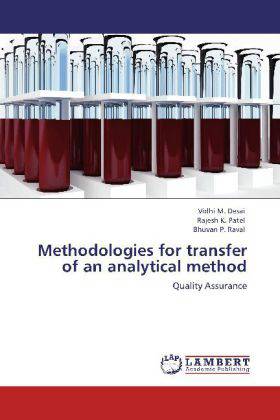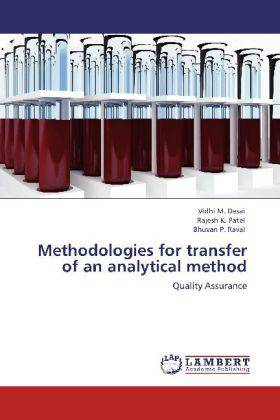
- Afhalen na 1 uur in een winkel met voorraad
- Gratis thuislevering in België vanaf € 30
- Ruim aanbod met 7 miljoen producten
- Afhalen na 1 uur in een winkel met voorraad
- Gratis thuislevering in België vanaf € 30
- Ruim aanbod met 7 miljoen producten
Zoeken
Methodologies for transfer of an analytical method
Quality Assurance
Vidhi M Desai, Rajesh K Patel, Bhuvan P Raval
Paperback | Engels
€ 48,45
+ 96 punten
Omschrijving
An analytical method transfer is a complete process that consists in transferring a validated analytical method from a sending laboratory (called sender) to a receiving laboratory (called receiver) after having experimentally demonstrated that it also masters the method. The process for the transfer of analytical methodology is, on the surface, a relatively simple operation. In its most common form, analytical method transfer is the verification that a method or test procedure works in an equivalent fashion at two or more different sites or laboratories and meets all acceptance criteria. This process is driven by compliance and governed by a statistical treatment of the resulting data. McGonigle defined Method transfer as "the introduction of a validated method into a designated laboratory so that it can be used in the same capacity for which it was originally developed". The transfer of a method from a laboratory to a production site is an important step in the development cycle of new pharmaceutical products.
Specificaties
Betrokkenen
- Auteur(s):
- Uitgeverij:
Inhoud
- Aantal bladzijden:
- 84
- Taal:
- Engels
Eigenschappen
- Productcode (EAN):
- 9783846514719
- Verschijningsdatum:
- 20/06/2012
- Uitvoering:
- Paperback
- Formaat:
- Trade paperback (VS)
- Afmetingen:
- 152 mm x 229 mm
- Gewicht:
- 136 g

Alleen bij Standaard Boekhandel
+ 96 punten op je klantenkaart van Standaard Boekhandel
Beoordelingen
We publiceren alleen reviews die voldoen aan de voorwaarden voor reviews. Bekijk onze voorwaarden voor reviews.











